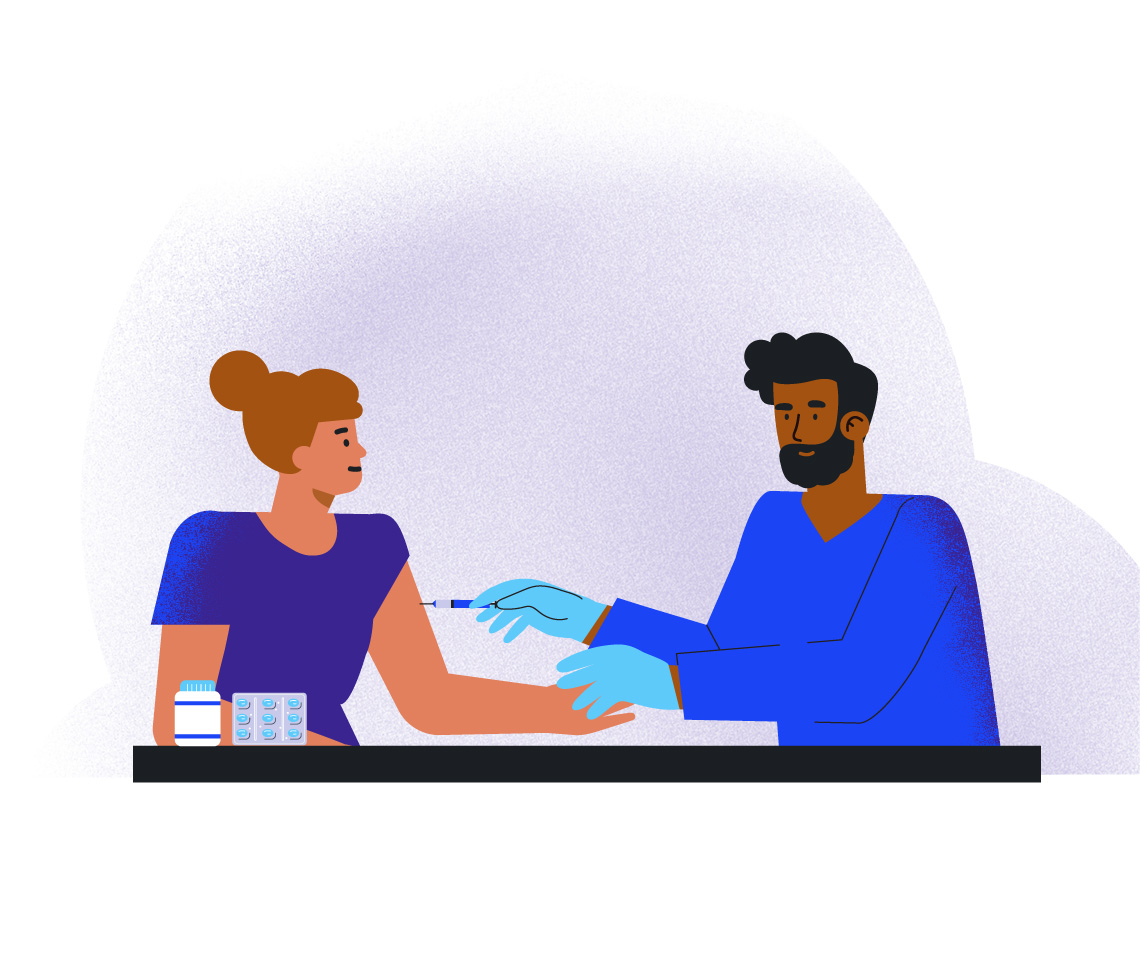Novice Nurse Series: How to Prepare Novice Nurses to Care for Patients with HIV/AIDS

Table of Contents
Name of the heading
1- Start your table with the syntax {start-table}
2 - Add an H3 Heading to create a new column (this will be the column title)
3 - List cells as bullet points in a List element
4 - End your table with the syntax {end-table}
Despite the widespread prevalence of HIV/AIDS, many nursing students nearing graduation report feeling unprepared to care for affected patients. Acknowledging the reality that the majority of new nurses will not be working in HIV-specific roles, many will still encounter patients living with HIV in various settings. Therefore, it is crucial that nurse educators equip their students with the right tools and knowledge.
With this in mind, how do nurse educators prepare students and novice nurses for the complexities of working with HIV/AIDS patients?
In this Novice Nurse Series, UbiSim is shedding light on the ways nurse educators can teach new nurses how to work with specific populations.
Addressing stigma and bias in HIV/AIDS care
Stigma remains a major barrier to care for people living with HIV/AIDS. Whether driven by fear, misinformation, or judgment, it can prevent patients from seeking care and create unhealthy environments. Novice nurses need to be trained to recognize both their own biases and societal stigmas affecting their patients.
Learning about stigma goes beyond understanding how HIV is transmitted. It’s about breaking down assumptions, like blaming patients for their condition, which can subtly influence how nurses treat them. Through self-reflection, nursing students can become more aware of these biases, helping them offer more compassionate and respectful care.
At the organizational level, healthcare facilities need to make sure they’re promoting a stigma-free environment. This means offering training on safety protocols, enforcing non-discriminatory policies, and ensuring access to things like post-exposure prophylaxis (PEP). Research has shown these kinds of changes are essential for creating a supportive, safe space for both patients and healthcare staff.
Ways to prepare novice nurses to care for HIV/AIDS patients
Promote cultural competence & humility
Cultural competence, often referred to now as cultural humility, is a critical component when caring for patients with HIV/AIDS. One nurse who cared for this patient population during the 1980’s epidemic and continues to focus on health care disparities commented, “race, income, gender identity, and sexual orientation are key to how someone experiences care. Being mindful of our patients’ lived experiences and understanding the unique needs of those with HIV/AIDS makes us stronger clinicians and teachers” (Fitting, 2023).
Research consistently shows that nurses trained in cultural competence demonstrate improved communication skills, leading to better patient compliance, higher satisfaction, and enhanced health outcomes. These skills are essential for novice nurses, especially when navigating the sensitive and complex care needs of patients with HIV/AIDS.
Utilize virtual reality to improve attitudes and therapeutic communication
Therapeutic communication is often difficult to simulate using traditional mannikins or standard clinical teaching methods. Virtual reality (VR) offers an immersive and effective way for learners to practice therapeutic communication, which is especially important when caring for patients who may be struggling with the emotional and psychological implications of an HIV/AIDS diagnosis.
A 2024 study examining the use of VR in nursing education found that students who trained using VR demonstrated significantly higher communication abilities and lower stress levels. The study concluded that VR is “acceptable and worthwhile for training nursing students to develop communication abilities” (Chou et al., 2024)
An additional benefit of VR in nursing education is the positive effect it can have on student’s attitudes and beliefs. Research has shown VR can help learners adjust their views regarding prejudices or stereotypes of stigmatized illnesses such as HIV/AIDS, which may have the potential to lead to providing more compassionate care (Altmiller et al., 2024).
In UbiSim’s HIV scenario, learners interact with a patient experiencing difficulty accepting an HIV diagnosis. This scenario immerses learners into a situation in which they are required to respond to difficult statements and questions to help future nurses develop empathy. This valuable experience can shift perspectives and train students in effective communication to prepare them to support and educate patients in this vulnerable position.
Encourage self-care
Nurses often put their patients’ needs ahead of their own, but this can lead to burnout and emotional exhaustion, particularly when caring for patients with chronic illnesses like HIV/AIDS. It is essential to instill the practice of self-care early in a nurse’s career. Nurse educators can encourage students to develop healthy coping mechanisms and ensure they understand the importance of maintaining their own mental and physical well-being while caring for others.
Provide education on pathophysiology and treatment
To provide effective care, nurses must have a solid understanding of HIV/AIDS pathophysiology and the latest treatment protocols. Nurse educators should ensure their students are well-versed in how the virus affects the immune system, the progression of the disease, and the various antiretroviral therapies (ART) used to manage it. Comprehensive knowledge of treatment options allows nurses to educate patients and provide care that aligns with the latest standards.
Teach infection control and prevention
Lastly, infection control and prevention are vital aspects of caring for patients with HIV/AIDS. Nurses must be knowledgeable in universal precautions and infection control protocols to protect themselves and their patients. Students may demonstrate negative attitudes in caring for this patient population based on fear of contracting HIV. Teaching novice nurses the proper use of personal protective equipment (PPE), hand hygiene, safe handling of sharps/needles, and safety protocols for healthcare personnel may alleviate this fear and improve attitudes further.
Final Thoughts
By focusing on key areas such as cultural humility, communication, and self-care, nurse educators can shape a new generation of healthcare providers equipped to care for HIV/AIDS patients.
Integrating these elements into education, nurse educators can ensure that new nurses are well-equipped to offer compassionate, informed care. Ultimately, this helps create a healthcare environment that supports both patients and professionals, leading to better health outcomes for those living with HIV/AIDS.
FAQs
Heading 1
Heading 2
Heading 3
Heading 4
Heading 5
Heading 6
Lorem ipsum dolor sit amet, consectetur adipiscing elit, sed do eiusmod tempor incididunt ut labore et dolore magna aliqua. Ut enim ad minim veniam, quis nostrud exercitation ullamco laboris nisi ut aliquip ex ea commodo consequat. Duis aute irure dolor in reprehenderit in voluptate velit esse cillum dolore eu fugiat nulla pariatur.
Block quote
Ordered list
- Item 1
- Item 2
- Item 3
Unordered list
- Item A
- Item B
- Item C
Bold text
Emphasis
Superscript
Subscript
Explore more

From 30 Minutes to 3: How AI Enhanced Analytics Transforms Debriefing Preparation
AI Enhanced Analytics: Scenario Performance Data now available in UbiSim's Version 1.19
.jpg)
Behind the Scenes: How We Brought Incisions & Dressings to Life in VR
How the UbiSim team built a VR system displaying 300+ distinct incision states—balancing clinical accuracy, technical constraints, and nursing education needs.
.jpg)
Step Inside the Room of Errors: Playful Exploration, Serious Skills
Learn how UbiSim's Room of Errors transforms nurse training through investigative play. Students spot hidden safety risks and build situational awareness.




